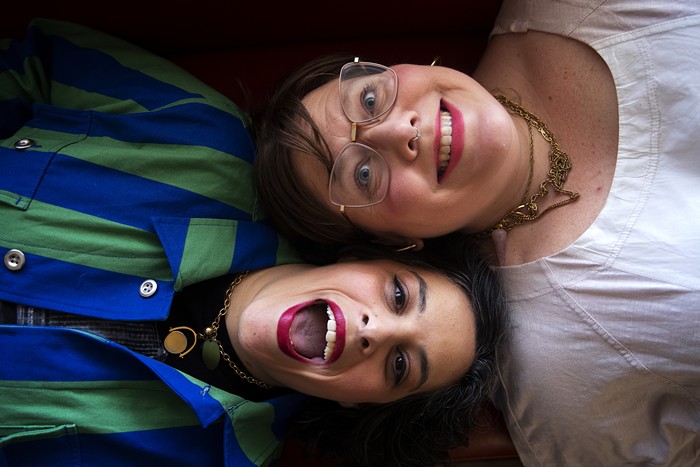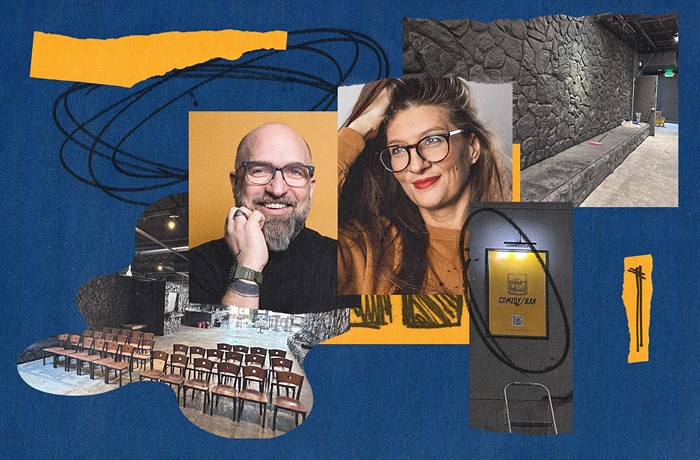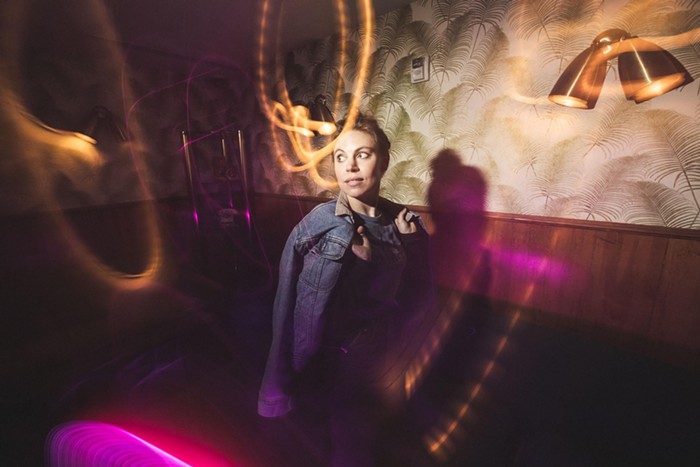Born in Canada to Somalian parents, Hoodo Hersi has been honing her comedy skills for 12 years, but her career zoomed into overdrive once she moved from Toronto to New York City in 2022. Two days after arriving in the US, the Muslim comic scored an amazing coup, getting booked for Late Night With Seth Myers [see clip below].
North Americans generally are not used to seeing a Black woman in a hijab wittily riff on white privilege and the most excellent qualities about Caucasian culture, so Hersi instantly carved out a distinctive niche in the comedy world. Hitting NYC's stand-up circuit hard, she won the approval of The Daily Show correspondents/hosts Hasan Minhaj and Roy Wood Jr. Hersi also recently completed two seasons as a writer for A24/Amazon's Untitled Ramy Youssef Animated television show.
As a Black Muslim woman in a white-male-dominated field, Hersi has had to overcome many obstacles to reach the relatively lofty position in comedy that she now occupies. She arrived here by finding rich seams of humor in interactions with her immigrant parents, her hilarious takes on race, and as a triply oppressed minority navigating cultural rifts in these Divided States of America. (“We need to make racism more equal,” she reasonably asserts.) I spoke with Hersi over the phone ahead of her June 25 gig at Here-After.
The Stranger: Can you talk about your beginnings as a comedian and what factors led you to devote your life to comedy?
Hoodo Hersi: Like most comics, number one, trauma. No normal person wants to stand up onstage and then make total strangers laugh. Something has to go wrong. But also my early influences... my mom is an incredibly funny woman, even though she hates the fact that I do comedy, but is slowly coming around to it.
That's such a paradox.
Also, my mom's a Baby Boomer and that generation doesn't respect the idea that you could be making money from just making strangers laugh. She's used to sweating and working multiple jobs. Work equals suffering [in her mind]. So the fact that I'm laughing and having a good time and making money is crazy to her.
Well, she better get used to it, right?
[Laughs] Yeah. My dad, on the other hand, is next-level supportive. My parents really respect colleges and universities, so I invited him to watch me do stand-up at my university. They were having this alumni awards event. After the event, my dad said, “I have no doubt in my mind that you're going to make it in comedy. You're going to be so successful. I hope I'm alive to see it. You're going to be a multi-millionaire. You're even smarter than Trevor Noah.” And my dad loves Trevor Noah.
I have to acknowledge my home influences, and obviously just being exposed early on to Chris Rock, Wanda Sykes. The Dave Chappelle Show was a huge influence. And Joan Rivers. People don't give Joan Rivers enough credit. That woman was relevant well into her 80s. I remember her doing Fashion Police on the E! Channel. She had a book and then she'd be touring and she'd be doing a play, and she always looks glamorous. I always remember seeing her on TV and thinking, “This woman is unstoppable.”
So, yeah, it definitely starts with trauma and family life
Can you elaborate on what you mean by “trauma”?
My parents, god bless, are from East Africa, from Somalia. So they are literally from countries where they were surrounded by Black people. They didn't give me tools [for dealing with racism], like code-switching and things like that. Now I'm being born and raised in Toronto, I'm in North America in a very white place.
My parents don't see white people as a threat. For the most part, they're not bothered by racism. They would never feel less than next to a white person. So, my parents couldn't give me the tools. “XYZ is going to come up, you're going to get bullied for the color of your skin. So this is how you're going to navigate that. And when you're at your job, you're going to have to learn how to talk to white people in a whole other fucking way.”
My mom would outsource code-switching to me. We would try to return shoes and the white lady sales associate would say, “Okay, ma'am, this is not going to work,” and my mom would say, “Just talk to her.”
That's a lot of pressure to put on a child.
I come from immigrant parents. “Hey, we suffered and done a lot of stuff for you, so the least you can do is code-switch for us.”
Dealing with racism is incredibly traumatic and nobody talks about that enough. It's one thing to be like, hey, your access to education and employment is a lot shittier. But it's a whole other thing when you're like, oh yeah, it really fucks with your self-esteem and who you are as a person and how you view the world. There's also colorism, where within your own community being dark-skinned is viewed as being hideous. Being a dark-skinned Black woman, now I've reached the point, after years of therapy, where I think, “Oh, this is actually a blessing and I'm really grateful I was born in this body in this era.”
Why did you leave Toronto for New York?
If you really want to make it in comedy, you want to really fuckin' come to America and make it. The saying is true: If you make it in America, in New York, you can travel anywhere and make it there. Let me do the harder thing first.
I was just talking to a buddy of mine, [former Toronto-based comedian] Che Durena, about this. We were talking about how our entry to New York comedy has been a very charmed one. I've obviously worked really hard, but a lot of people don't talk about how, with anything in life, there's an element of luck. I moved to New York on July 17 and literally my second day in New York I was booked to do Seth Myers. The timing just happened to line up.
From there, it was a lot easier to get bookings in the city, because people respect a late-night credit in New York. That helped so much. Ten days later I was doing Just for Laughs and a couple months later I was staffed on a writing show. I'm writing on... not now because there's a writers strike. But I was writing for Ramy Youssef's animated show for Amazon before the [Writers Guild of America] strike. Then, boom, I did the Comedy Central taping, which came out two weeks ago.
New York is kind of a terrible place for your mental health in that you feel like you're not doing enough. But now, in talking to you, I'm like, yeah, in less than a year, I've been able to accomplish so much. Maybe I should give myself some credit.
Were you performing every night on the stand-up circuit? I'm wondering how Seth Myers discovered you. How did you get on a prestigious show so quickly?
August will mark my 12th year doing stand-up. I'm definitely not an overnight success. There's also been the legal element, like getting a visa and stuff. By the way, getting a visa during the Trump administration... I have to figure out how to turn that into a joke. It's such an accomplishment of mine.
I remember telling my manager—I always wanted to do late night. I remember him reaching out to James Corden and I got some feedback, and it just happened to work out with Seth. My manager already had that connection with the booker. Shout out to my manager Ethan [Stern]—such great instincts. I would work on a five-minute set and he would say, “Listen, this is the set where you want to introduce yourself to the world. You can't tell a joke just for the sake of telling a joke. You want to be selective about the jokes you put into the set.” I would record a set and he'd give me feedback; we did that back and forth for months, before I even moved to New York. Finally, the set was ready. He sent it to Emily, the booker, and she said, “It's really good.” Usually bookers will have notes, but she said, “No notes,” and boom, it came out like that.
You said something in one of your sets that was so powerful: “Making white people uncomfortable is my heroin.” But here's the thing; I imagine the majority of your audience is white. Right?
They are. But also, a lot of queer folks support my comedy.
I wonder, with your majority white audiences, if there's a degree of sadomasochism at play here. Maybe they like being the butt of your jokes? It's a curious dynamic.
Here's the thing. When queer comics make fun of straight people, I don't defend straight people, because I understand what we are. White people who have a sense of humor and have perspective understand that I'm not targeting them when I say the joke. I'm talking about the ignorant white person who doesn't want to grow or learn anything new, who doesn't care about identifying their blind spots. Those are the white people I'm making fun of, and I think [my audiences] get that.
It's like the white people who like Chappelle or Chris Rock or Wanda Sykes. They're saying jokes about white people and white people will laugh. I remember seeing Chris Rock live for his Tamborine tour, and the audience was mostly white. They were laughing at all these jokes about white people; they just get it. "Listen, some of us are great and a lot of us in power are not great."
Obvious question, but have you encountered any sexism, racism, or Islamophobia in your time as a stand-up?
It's so funny, because I'm working on a joke right now. I laugh when people ask, “What's it like dealing with racism?” I'm like, “My mother doesn't believe in my dreams—why do you think racism is going to hurt my feelings?” The woman I love the most on this planet doesn't believe in me. She thinks I'm really smart and I'll be successful, but she hates comedy.
Yeah, it's so interesting, because I don't know which [aspect of my identity] people don't like sometimes. Is it the me being Black, is it the me being Muslim, is it me wearing the hijab, is it me being dark-skinned? Of course I know there's racism, but I try to focus—and my therapist and I have been working through this... By the way, if you're a comedian and you're not going to therapy, what are you doing with your life? You're asking to die young.
My therapist was trying to get me to focus on the actual good that I have in my life: I have a great manager and I've really been blessed. It sounds so cheesy to say that. There is racism, those things are very real, and I understand that I have to work a lot harder than the average comic, and that's okay because at some point I totally plan on doing a Sarah Silverman semi-retirement thing. I'm gonna work my ass off for these next 10 years and then I fucking plan on ending early.
Sarah Silverman just came out with a special a few weeks ago, but no one's really heard from her and she's very selective about the projects she does. She takes long breaks from the business. I totally am going to do some shit like that... or I'll end up being Joan Rivers, but I probably see myself being more Sarah Silverman.
Is there fierce competition among comics of your uncommon demographic in North America, or is everyone very supportive?
I don't even think about that. When I do comedy, this is the thing I always tell younger comics who are just starting out... And this happens because we're in a business that tends to pit comics against each other, but you really have to focus on the fact that you're in competition with your past self. The Hoodo from two years ago? The Hoodo from today would totally make her proud. I'm in New York, I've done late-night, I've written for a TV show, I'm working on my own project... The past me would be like, okay, I'm progressing. That's the only way to stay sane in this business.
Also, art is incredibly subjective. It's not like weight-lifting or basketball, where there's a point system. What's funny to people is incredibly subjective. The idea where I'm in competition with anyone, it's insane and you're going to run yourself into the ground.
In North America, you don't see a lot of comics who have your background, so I'm wondering, is there a support group, are there chat rooms online where comics commiserate and help one another?
There are so many more Black comics in New York than in Toronto. But even in Toronto, I had a great support system. But in New York, there are so many successful Black female comics who have been so supportive. Even Muslim comics... Ramy Youssef, I met him in 2014 in New York; I was doing a comedy festival. This was before his Golden Globe Award, his TV shows, and all this stuff. We stayed in touch, became friends, and then finally he hired me as a writers' assistant on his show and I did well enough in the room that I got promoted in the first season that I got promoted to staff writer. Then I got into the Writers Guild of America. I owe so much to Ramy.
Hasan Minhaj, he was on The Daily Show and has a show on Netflix called Patriot Act. He always lets me open for him when I ask and he wrote a letter for my visa. [Occasional Daily Show host] Roy Wood Jr., same thing. He wrote a letter for my visa and let me open for him. Dulcé Sloan. I've really felt a lot of support from Black comics and other Muslim comics.
I will also say that Ryan Reiss, who used to run a show at the [NYC club] Comedy Cellar, Fat Black Pussycat, comedians from the Late Night With Seth Myers show. I reached out to him and he was really nice and let me perform. He's a white guy—I wanted to give a token white. Ryan Reiss, great guy, love him. My buddy Che Durena is a Canadian comic; we moved out to New York around the same time. He gives me tons of great advice on what to do with social media, because comics obviously have to have an online presence. I have felt so, so lucky moving to New York.
What topics will you never address in your act, and why? Or are taboo subjects for the spineless?
I don't ever approach my comedy that way, where I go, “Okay, I'll never say a joke like this.” If a joke is about a group I've no part, if I don't have an interesting take on a group that I have no part of, then I won't say the joke.
The other night my friend and I were talking, and she's a lesbian. She said something and I said something back and she laughed. In my mind, I thought this would be a funny joke, but it's not my joke to tell. Also, it would be way more interesting coming from her.
So, sometimes I think, I just don't have an interesting angle, so it's not worth pursuing. Honestly, if you look at Ricky Gervais and all these comedians, Gervais has tons of jokes about the Holocaust and he's not Jewish. It's really, is your POV actually interesting? Most topics you can make a joke about; you just gotta be sure it's a really good joke.
Hoodo Hersi performs Sunday June 25 at Here-After, 7 pm, $20, 21+. Follow her on Instagram @hoodocomedy.


















